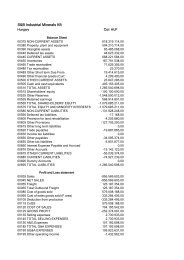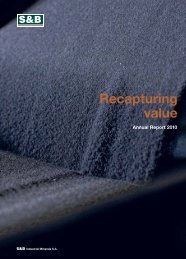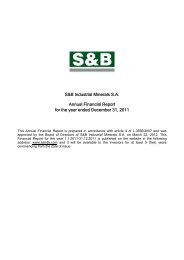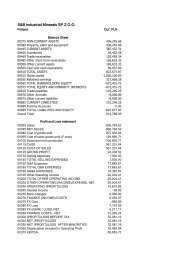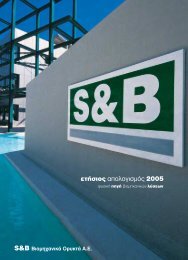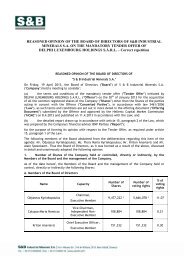CEBO International BV
CEBO International BV
CEBO International BV
You also want an ePaper? Increase the reach of your titles
YUMPU automatically turns print PDFs into web optimized ePapers that Google loves.
Management Letter 2010<br />
<strong>CEBO</strong> <strong>International</strong> B.V.<br />
14 January 2011<br />
AUDIT
Contents<br />
The contacts at KPMG<br />
in connection with this<br />
report are:<br />
Daniël Kleijn<br />
Partner, Alkmaar,<br />
KPMG Accountants N.V.<br />
Tel: +31 [0]72 514 3852<br />
Fax: +31 [0]72 514 3801<br />
kleijn.daniel@kpmg.nl<br />
Page<br />
Introduction 2<br />
General 3<br />
Findings 2010 4<br />
Solved findings 2009 5<br />
John Kloos<br />
Manager, Alkmaar,<br />
KPMG Accountants N.V.<br />
Tel: +31 [0]72 514 3800<br />
Fax: +31 [0]72 514 3801<br />
kloos.john@kpmg.nl<br />
© 2010 © 2010 KPMG KPMG Accountants Accountants N.V., N.V., a Dutch a Dutch limited limited liability liability company, company, is a subsidiary is a subsidiary of KPMG of KPMG Europe Europe LLP and LLP a and member a member firm firm of the of KPMG the KPMG network network of independent of independent member member firms firms affiliated affiliated with with<br />
KPMG KPMG <strong>International</strong> <strong>International</strong> Cooperative Cooperative (‘KPMG (‘KPMG <strong>International</strong>’), <strong>International</strong>’), a Swiss a Swiss entity. entity. All rights All rights reserved. reserved.<br />
1
KPMG Audit<br />
P.O. Box 9148<br />
1800 GC Alkmaar<br />
The Netherlands<br />
Ampèrestraat 19<br />
1817 DE Alkmaar<br />
Tel +31 (0) 72 514 3800<br />
Fax +31 (0) 72 514 3801<br />
The Netherlands Fax +31 (0) 72 514 3801<br />
Confidential<br />
<strong>CEBO</strong> <strong>International</strong> B.V.<br />
The Management and Supervisory Board<br />
Attn: Mr. E. Bernard<br />
PO P.O. Box70<br />
1970 AB IJMUIDEN<br />
Alkmaar, 14 January 2011<br />
Dear Sirs,<br />
As part of our audit of the financial statements of your company for the year ended<br />
31 December 2010, we have made a study and evaluation of the company's<br />
accounting procedures and system of internal control to the extent we considered<br />
necessary within the scope of the audit.<br />
An audit involves performing procedures to obtain audit evidence about the amounts<br />
and disclosures in the financial statements. The procedures selected depend on the<br />
auditor's judgment, including the assessment of the risks of material misstatement of<br />
the financial i statements, whether h due to fraud or error. In making those risk<br />
assessments, the auditor considers internal control relevant to the entity's preparation<br />
and fair presentation of the financial statements in order to design audit procedures<br />
that are appropriate in the circumstances, but not for the purpose of expressing an<br />
opinion on the effectiveness of the entity's internal control.<br />
One of the objectives of internal control is to guarantee that the financial accounting,<br />
which forms the basis for the financial reporting and decision-making, is sufficiently<br />
reliable and up-to-date for taking reliable management decisions.<br />
This letter is based on our normal work in the context of the audit of the financial<br />
statements. Accordingly, we should point out that this letter does not necessarily<br />
reflect all the deficiencies in your organization that may have been highlighted by a<br />
more specifically focused study and evaluation.<br />
Within the scope of our audit of the financial statements, we also have made a study<br />
and evaluation of the system of internal control with respect to the electronic data<br />
processing. This included the electronic data processing only where relevant to this<br />
audit of the financial statements.<br />
The audit of the financial statements is not specifically focused on the reliability<br />
and continuity of the electronic data processing and therefore does not necessarily<br />
lead to findings that may be highlighted by a study and evaluation that is<br />
specifically focused on this.<br />
Our audit is not geared specifically to detecting fraud. The primary responsibility<br />
for preventing and detecting fraud lies with the company's management.<br />
The auditor is neither responsible nor liable for the prevention of fraud.<br />
As you may appreciate, the management letter is critically by nature. We are, after<br />
all, specifically reporting possible shortcomings or opportunities for improving<br />
the financial and administrative processes and internal control. At your request,<br />
this letter outlines how the financial and administrative processes and internal<br />
control can be improved.<br />
This letter was agreed with Steve Gray (managing director) and Edwin Bernard<br />
(financial controller) on 21 December 2010. Feedback and comments have been<br />
incorporated in this letter where appropriate.<br />
p<br />
We would be happy to assist you in elaborating control measures.<br />
The recommendations and solutions offered in this letter provide you with<br />
reference points for this elaboration.<br />
This report is intended solely for your information and may not be distributed, in<br />
whole or in part, to any other party without our prior written consent.<br />
We would like to thank the Management and staff of Cebo <strong>International</strong> B.V. for<br />
their cooperation during our audit and the compilation of this report.<br />
We would be happy to provide you with any additional information you may<br />
require.<br />
Yours sincerely,<br />
KPMG ACCOUNTANTS N.V.<br />
KPMG Accountants N.V., registered with the trade register in the<br />
Netherlands under number 33263683 and a member firm of the<br />
KPMG network of independent member firms affiliated with KPMG<br />
<strong>International</strong>, a Swiss cooperative.<br />
All our services are subject to our general conditions, which are filed<br />
at the Amsterdam District Court under number 32/2004, and which<br />
we will send to you on request.<br />
D.J.H. Kleijn RA
General<br />
Business risk discussion<br />
<strong>CEBO</strong> made an overview of her business risks. We discussed this overview with you. The challenges for the next years will be:<br />
• The increase of sales prices in case of an increase of the purchase price;<br />
• The increase of gross margin by stopping low margin sales or enhancing their pricing conditions, and the increase of efficiency in the plants;<br />
• Garantuee delivery times of products by increasing the number of raw material suppliers, thus decreasing the current supplier dependency, even if this<br />
will lead to increasing purchase / freight costs. For this reason, <strong>CEBO</strong> bought 10,000 tons of raw material from an Indian supplier at the end of 2010<br />
with an increased cost price, and <strong>CEBO</strong> entered into a five years delivery contract (without price component);<br />
Furthermore, <strong>CEBO</strong> defined management development and business continuity as a focus point for the future. A plan to decrease key personnel<br />
independence is under construction, and several actions have been taken. At this moment, in particular the R&D position should be reassessed.<br />
The hedging policy of the company is to hedge foreign currency risks on a transaction basis. The foreign currency risks related to the holding activities are<br />
controlled by the dividend policy for <strong>CEBO</strong> UK.<br />
Other remarks<br />
<strong>CEBO</strong> Marine<br />
In 2010, management increased involvement in the pricing process of <strong>CEBO</strong> Marine, resulting in increasing sales prices. Sales prices for certain routes have<br />
been increased up to 60% without loss of customers. Also the financial focus for <strong>CEBO</strong> Marine has been increased. Every different route has been analysed in<br />
more detail, and is financially evaluated when realized. The cut off of direct costs like harbour costs has been increased by this evaluation.<br />
Sales price controls<br />
<strong>CEBO</strong> performs a check on the sales prices by evaluating the gross margin per order every day. Incorrect prices are found and corrected. When invoicing sales<br />
orders, <strong>CEBO</strong> does not use a masterdata file for sales prices. Therefore, every sales price per order has to be entered into the system manually. We advise<br />
you to investigate the possibilities to use a masterdata file to invoice the sales orders, thus decreasing the workload related to the invoicing process.<br />
Production<br />
<strong>CEBO</strong> manually enters the production from the plant into the system. We understand that this can be automated, but at this moment will not be done due to<br />
the wish to better monitor the input.<br />
Salary process<br />
Only the financial controller is involved in the salary process, the managing director only signs the monthly payments. <strong>CEBO</strong> chooses to do this, due to the<br />
sensibility of this process. We advise you to investigate the possibilities to enhance the level of segregation of duties related to this process.<br />
© 2010 © 2010 KPMG KPMG Accountants Accountants N.V., N.V., a Dutch a Dutch limited limited liability liability company, company, is a subsidiary is a subsidiary of KPMG of KPMG Europe Europe LLP and LLP a and member a member firm firm of the of KPMG the KPMG network network of independent of independent member member firms firms affiliated affiliated with with<br />
KPMG KPMG <strong>International</strong> <strong>International</strong> Cooperative Cooperative (‘KPMG (‘KPMG <strong>International</strong>’), <strong>International</strong>’), a Swiss a Swiss entity. entity. All rights All rights reserved. reserved.<br />
3
Findings 2010<br />
Issue Observation Risk Recommendation Management comment<br />
1. ICT; rights granted Within the ICT system “Navision” the<br />
logical access security is enforced by a<br />
combination of a unique username and<br />
password for all employees. The rights<br />
granted to the employees are<br />
considered as complete for the<br />
performance of the tasks of these<br />
departments. However, there is no<br />
structural periodic check whether the<br />
rights granted within the ICT system are<br />
still in line with the rights necessary for<br />
the tasks to be performed.<br />
This may result in unauthorized access<br />
to the system.<br />
We recommend a frequent check<br />
whether the rights granted are still in<br />
line with the necessary rights for<br />
performing the tasks.<br />
Full check on rights granted will be<br />
executed by the controller in December<br />
2010 and will be repeated yearly.<br />
2. ICT; control possibilities Navision offers many control<br />
possibilities, of which some possibilities<br />
have been implemented in the internal<br />
control process of Cebo. However, at<br />
the moment some controls are still<br />
performed manually.<br />
Inefficiency.<br />
Investigate which controls could be<br />
embedded in the automated processes<br />
to a larger extent, for example by using<br />
log files for changes in master files (for<br />
example bank account numbers of<br />
accounts payables).<br />
In Navision a document is created which<br />
enables us to see the margin per<br />
delivery. Based on this document we<br />
can better monitor our revenue and we<br />
can take actions for new deliveries.<br />
Optimization of the use of automated<br />
controls will continue to be our focus<br />
point.<br />
3. Goods movements No structured goods movement list is<br />
An overall goods movement list can be<br />
We recommend setting up a system of<br />
We already made a goods movement<br />
compiled for the different flows of<br />
materials for the complete process from<br />
“purchase up until sales”. At the<br />
moment the controller investigates the<br />
possibilities in Navision to generate<br />
these reports.<br />
used as an overall check on the<br />
completeness of the recorded sales. It<br />
can also generate information for the<br />
assessment of milling losses, et cetera.<br />
goods movements in Navision.<br />
list on detailed level. Know our focus is<br />
to set up a full goods movement list.<br />
Related to this full goods movement list<br />
we decided to have a full stock count<br />
twice a year.<br />
4. Control of the outgoing<br />
invoices<br />
The procedure is that all outgoing<br />
invoices are checked by at least two<br />
executives. During our interim we<br />
observed that not all outgoing invoices<br />
are checked by at least two executives.<br />
This may result in incorrect or<br />
incomplete invoice.<br />
We recommend you to reconsider your<br />
procedures which contains explicit<br />
details regarding the procedure when an<br />
executive is absent.<br />
We will follow-up your recommendation.<br />
© 2007 2010 KPMG Accountants N.V., a Dutch limited liability company, and is a a subsidiary member firm of KPMG of the Europe KPMG LLP network and a of member independent firm of member the KPMG firms network affiliated of with independent KPMG <strong>International</strong>, member firms a Swiss affiliated with<br />
cooperative. All rights reserved. KPMG <strong>International</strong> KPMG and the Cooperative KPMG logo (‘KPMG are registered <strong>International</strong>’), trademarks a Swiss of entity. KPMG <strong>International</strong>, All rights reserved. a Swiss cooperative.<br />
4
Solved findings 2009<br />
Issue Observation Follow-up<br />
1. ID card new employees During our audit we observed that one of the new employees had no<br />
valid ID card.<br />
2. Partially stocktaking No stock-taking has been carried out during 2009 on the raw<br />
materials and the finished goods.<br />
The controller has received the ID card of the new employee. During<br />
our audit we have checked this.<br />
At year-end we have executed a total stock count, both for raw<br />
materials as for finished products. For 2010 we have already<br />
executed a total stock count for the location IJmuiden and OBA in<br />
Amsterdam. The procedure is that we will have a full stock count<br />
twice a year.<br />
© 2007 2010 KPMG Accountants N.V., a Dutch limited liability company, and is a a subsidiary member firm of KPMG of the Europe KPMG LLP network and a of member independent firm of member the KPMG firms network affiliated of with independent KPMG <strong>International</strong>, member firms a Swiss affiliated with<br />
cooperative. All rights reserved. KPMG <strong>International</strong> KPMG and the Cooperative KPMG logo (‘KPMG are registered <strong>International</strong>’), trademarks a Swiss of entity. KPMG <strong>International</strong>, All rights reserved. a Swiss cooperative.<br />
5



